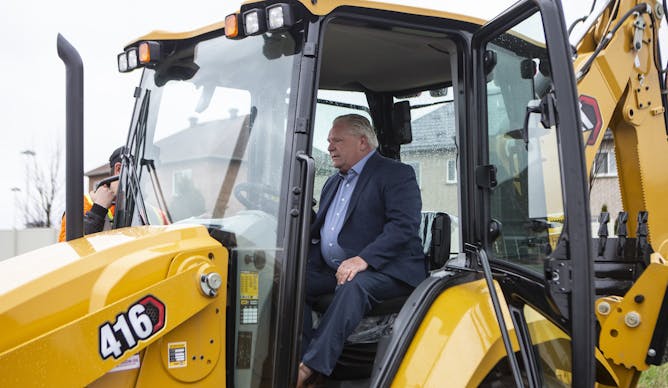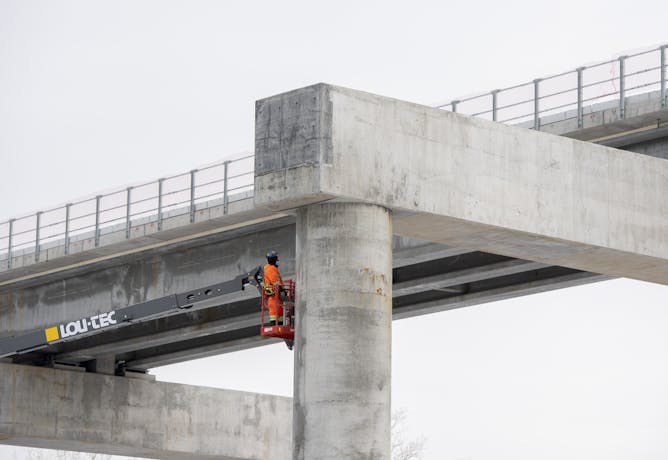|
The economic side of climate change has surfaced lately, with a lot of discussion about how much it will cost to meet the world’s climate targets. But there’s been little information around what the financial costs of climate change might be. A new study finds that investing now will avoid the worst effects of climate change — and save money in the future.
Today in The Conversation Canada, Neal Willcott and Sean Cleary from Queen’s University write about the costs and benefits of investing in ways to reduce greenhouse gas emissions. The financial cost of achieving Canada’s emissions targets is large, but it pales in comparison to the physical costs due to damaged infrastructure that comes with 5 C of warming — or even 2 C. “There is a big incentive to act now,” they write. “The costs of climate change damage are expected to grow gradually until 2050, around which time there is a sharp increase.”
Also today:
|

Wolverine numbers are declining globally due to heavy trapping and predator killing by humans, habitat loss, climate change and various other factors.
(Shutterstock)
Jason T Fisher, University of Victoria; Aerin Jacob, University of Northern British Columbia
The key to protecting wolverines around the world is to reduce trapping, minimize predator control pressures, and to protect and connect large blocks of intact habitat they need to survive.
|

Ontario Premier Doug Ford attends a photo opportunity on a construction site in Brampton as he kicks off his re-election campaign on May 4, 2022.
THE CANADIAN PRESS/Chris Young
Mark Winfield, York University, Canada
Looking back on Ford’s four years in power reveals four themes in his approach to governance — and what the next four years might have in store if he wins again.
|

Sport and recreation are political issues because different governments view their role in delivering these services differently. A better understanding of how political parties view sport and recreation can help inform voters’ decisions when they head to the polls.
(Shutterstock)
Kyle Rich, Brock University
Voters need to hold political candidates and their parties to account on sport and recreation issues and advocate for support from provincial and territorial governments.
|

Abortion-rights demonstrators hold up letters spelling out ‘My Choice,’ Saturday, May 14, 2022, outside the United States Supreme Court in Washington, D.C.
(AP Photo/Jacquelyn Martin)
Charlie Rioux, University of Manitoba; Leslie E. Roos, University of Manitoba; Lianne Tomfohr-Madsen, University of Calgary
Restricting abortion access has negative effects on parents, as well as children and families, including increased poverty, unemployment, pregnancy-related deaths and higher health risks in children.
|

A piece called ‘The Last Stand’ by David Ellingsen.
(David Ellingsen)
Melanie Kloetzel, University of Calgary
Climate artists can offer a vision of tangible networks, activities, behaviours and lifestyles that, rather than damaging the planet, support planetary — and personal — health and well-being.
|

Lorsque l’on mange, parle ou baille, les mouvements de la mâchoire déforment le conduit auditif. Après conversion en énergie électrique, ces déformations pourraient alimenter tout type de technologie intra-auriculaire.
(Shutterstock)
Michel Demuynck, École de technologie supérieure (ÉTS)
Le potentiel énergétique de nos oreilles est sous-estimé : les déformations du conduit auditif pourraient alimenter les technologies intra-auriculaires.
|

Un ouvrier s'affaire sous une section du Réseau express métropolitain (REM), le nouveau réseau léger sur rail automatisé, à Montréal, le 2 février 2022.
La Presse canadienne/Graham Hughes
Maude Brunet, HEC Montréal
Les grands projets structurants ont des impacts importants sur la société actuelle et les générations futures. Une réelle gouvernance participative et inclusive devrait être adoptée pour les gérer.
|
Ukraine Invasion
|
-
Ronald Suny, University of Michigan
Turkish president Recep Tayyip Erdogan is against allowing two Scandinavian countries to join NATO over what he deems their support of ‘terrorists.’ His opposition will test the alliance’s unity.
|
|
COVID-19
|
-
Michael Head, University of Southampton
After reporting zero COVID cases until now, North Korea is facing a rapidly-spreading outbreak of the omicron variant. Here’s how things could play out.
|
|
Culture + Society
|
-
Emmy Kageha Igonya, African Population and Health Research Center
A significant number of Rwanda’s LGBT community experience hostility. This includes at work and when trying to access health services.
|
|
Science + Tech
|
-
Andy Weiss, Vanderbilt University; Caitlin Murdoch, Vanderbilt University
While iron and calcium are the metals that get the most attention, zinc is also important for human health and function.
|
|